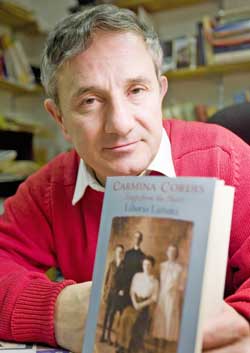Volume celebrates forgotten poet

Italo-Canadian Studies Professor Filippo Salvatore poses with his recently published collection of Liborio Lattoni’s early 20th century poems. Salvatore said Lattoni’s work documents the mixed sentiment and confused sense of belonging that new immigrants to Canada may feel.
Photo by andrew dobrowolskyj
It is said that there is a poet in everyone. One Concordia professor has discovered the inner bard of Liborio Lattoni, a Methodist pastor and one of the most prolific writers in the history of Montreal’s Italian community.
Filippo Salvatore first encountered Lattoni’s poems nearly a decade ago in the pages of the Montreal-based Italian newspaper Il Cittadino Canadese while researching another book.
A selection of poems from the final phase of Lattoni’s life (1943-1958) have been lovingly translated from the original Italian into English by Salvatore and compiled into Carmina Cordis: Songs From the Heart.
Lattoni, who arrived in Montreal in 1908, “was a cultural aristocrat. He was one of the most outspoken proponents of Italian nationalism and culture, and that explains the kind of poetry he writes,” said Salvatore, who teaches Italian and Italo-Canadian studies in the Department of Classics, Modern Languages and Linguistics.
Lattoni lavished copious praise on all things Italian, and described Imperial Rome, the Renaissance, and the writings of Dante Alighieri in superlative terms.
“Its glory, very pristine, shines like silver light through the centuries. Its perennial, immense and fragrant beauty illuminates heaven,” Lattoni wrote of his native Italy in a piece entitled Evoè! (To Health!).
In the early 1920s, Italian nationalism hit a new high with Mussolini’s rise to power. His promise of renewed greatness for Italy swayed thousands at home and abroad, many of whom also saw him as a “saviour “ from the communist threat, Salvatore said. Lattoni was among them.
“His adherence to fascism is very clear. That’s the weak point of his poetry: It becomes propaganda, which to a degree justifies the fear of the Canadian government at the time.”
Several of Lattoni’s works during the 1930s are so politically unpopular that Salvatore thought them best left untouched. They appear at the back of the book, but only in the original Italian.
When Canada declared war upon Italy in 1940, Lattoni became one of the thousands of Italian-Canadians sent to internment camps during World War II, deemed untrustworthy or sympathetic to the fascist regime.
Although it took years, he eventually warms to his adopted homeland. In For the City of Sherbrooke, he writes: “… O City, arising from the shores of the St. Francois and the Magog, I throw my soul and cheerfully I whisper, “Sherbrooke, I love you!”
Translating nearly 50 poems was “a hell of a job,” but an immensely rewarding one, Salvatore said. Not only were Lattoni’s works translated, the original rhyming verses were transformed into prose.
“It’s like translating Dante into English. The best way to translate The Divine Comedy is to put it into prose. It better expresses the power that you find in Dante’s language, as well as in Lattoni’s.”
Salvatore sees the continued relevance of Lattoni’s work. “He’s one of the great postcolonial writers of our time. Not only is he the first great Italo-Canadian writer, I think he’s one of the first great Canadian artists of any origin to claim this indigenous feeling of belonging.”